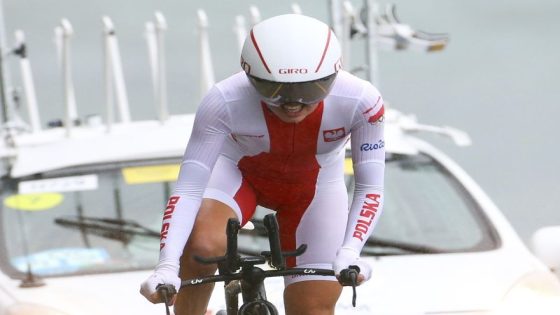(Reuters) – Poland’s Katarzyna Niewiadoma won the Tour de France Femmes in dramatic fashion while suffering the worst pain she had ever experienced and now dreams of a day when men and women are treated equally in sports.
On Sunday, Niewiadoma fought off the challenge of defending champion Demi Vollering in one of the most exciting final stages of any race, where the Dutch rider crossed the line first but the Pole bravely hung on to the yellow jersey.
Vollering began the last day eighth overall, one minute and 15 seconds behind, but was expected to provide the biggest danger and when she made her move on the penultimate climb, Niewiadoma believed it was all over.
“Definitely there was a point on the climb, especially at the top of Col du Glandon where I thought I’d lost everything because I didn’t feel great, physically or mentally,” Niewiadoma told Reuters.
“It wasn’t helpful not being up there when Demi attacked. From that moment until the end of the climb was really hard mentally.
“On the descent I just ate everything I had and regained my power and once I started to feel like my body was responding on the descent, I thought, okay I just have to try.”
That renewed energy lasted only a while and in the final stages Niewiadoma, despite running on empty, somehow continued to chase down her rival.
“The energy only lasted until three kilometres to go because from that point it was the worst experience I’ve ever had in my life on the bike, pain-wise,” the Canyon–SRAM rider said.
“It was just a matter of staying on the bike and trying to push; I don’t even know what I was doing with my body but I was trying to get there at all costs.”
Vollering was the first to reach the finish, gaining an extra 10 seconds for the stage win, but Niewiadoma battled until the very end, coming in fourth and doing enough to win the Tour by four seconds.
“When I crossed the finishing line, to be honest my mind was blank,” Niewiadoma said.
“The last three kilometres were so terrible and I was in so much pain that all I wanted was to just lay down.
“I remember crossing the line and dreaming of open space so I could lay down and see nobody. All of a sudden I heard screaming in my ear which was amazing because then we learned that we won the Tour de France.”
Niewiadoma, third in the previous two Tours, triumphed in a race which concluded on an iconic climb and while she might have preferred an easier ending, the finish attracted plenty of interest.
“Definitely it was very special to finish on Alpe d’Huez but on Saturday I was dreaming how nice it would be to finish in Paris knowing the jersey was secure,” Niewiadoma said.
“But I think the last battle brought a lot of attention because it was very interesting to watch not knowing what would happen until the last metres.
“I think, as riders, it was insanely brutal, beautiful and challenging but also rewarding for the whole sport.”
Her financial reward was 50,000 euros ($55,735.00), while Tadej Pogacar, winner of the men’s Tour last month, earned 10 times that amount, but Niewiadoma, 29, believes this will change.
“I think eventually we will get where we should be. The goal of every rider is to one day have a daughter that competes in sports and laughs at the times when there were differences between men and women,” she said.
“It should be totally normal that for equal suffering, there’s an equal reward.”
The Polish word “niewiadoma” translates as “unknown” and while she was already a major force in cycling, her dramatic Tour de France win means Katarzyna Niewiadoma’s name will forever be linked with the race.
($1 = 0.8971 euros)
(Reporting by Trevor Stynes in Krakow; editing by Clare Fallon)
Source Agencies



